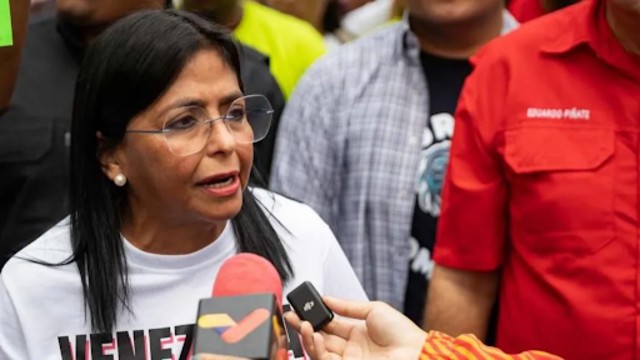
Venezuelan Vice-President Delcy Rodríguez took part in protests demanding the release of the deported prisoners. EPA
Gertrudis Pineda is devastated. Her son, Oscar, is among 238 Venezuelans deported by the US to a notorious high-security prison in El Salvador. She is desperate for any news but has heard nothing. Tears fill her eyes as she talks about Oscar.
“My son only wanted a better life, but now he’s living a nightmare,” she says.
Oscar used to live in Dallas, Texas, where he installed carpets to support his family. He regularly sent money home to Venezuela, helping pay for his diabetic father’s medication. Now, he is locked away in the Cecot prison, which was built for violent Salvadoran gang members.
The US government claims the deported Venezuelans are part of the Tren de Aragua gang. They were expelled under the 1798 Alien Enemies Act, bypassing legal proceedings. The US Justice Department ignored a judge’s order to halt the deportation flights.
Gertrudis knew her son had been detained by US immigration officers, but she thought he was still in Texas or heading back to Venezuela. She only found out about his fate when her other son, who lives in Colombia, saw Oscar’s name on a list of prisoners shown on TV.
Footage from Cecot showed the deported men having their heads shaved upon arrival. Gertrudis spotted Oscar by the rose tattoo on his forearm.
“They’re treating them like animals,” she says, sobbing. “Where are their human rights?”
The US government insists the deportees were carefully screened and claims they are all dangerous gang members. However, court documents reveal that many of them have no criminal records in the US.
Human rights activists describe Cecot as a “black hole” where prisoners vanish without communication. Gertrudis says it feels like the same void of information. She last saw her son shackled, head shaved, and wearing a white prison uniform. She doesn’t know if he is kept in windowless cells, like the Salvadoran prisoners who, according to El Salvador’s president, “don’t see a ray of sunlight.”
In Venezuela, Gertrudis and other families are protesting, demanding the release of their loved ones. They wave Venezuelan flags and hold signs saying, “Oscar is not a criminal.”
Criticism of the deportation is growing in both the US and Venezuela. Salvadoran lawyer Napoleon Campos calls the move illegal, saying it violates constitutional rights. He argues the Venezuelans should not be held in Salvadoran prisons since they have committed no crimes in the country.
Venezuelan vice-president Delcy Rodríguez has also joined the protests. She believes the deportation is unjust and is pushing for the prisoners’ release.
For now, Gertrudis can only hope. She is caring for Oscar’s eight-year-old son while his father sits in a foreign prison. She tearfully pleads for Oscar to be sent home.
“If they did anything wrong, let them face justice in Venezuela,” she says. “They must send them home.”















